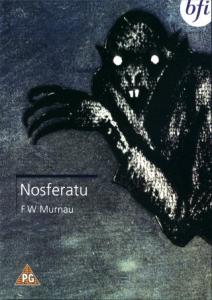************************************************************** EDITOR’s RECOMMENDATION February 2002 **************************************************************
DVD Review
Film:
Nosferratu, eine Symphonie des Grauens
starring: Max Schreck * directed by: FW Murnau
new musical score composed by James Bernard * City of Prague Philharmonic conducted by Nic Raine
DVD BFIVD520 [88 minutes]

Rapidly following Eurkea's two disc set in January 2001 and Dark Vision's single disc issue last Autumn this is the third UK DVD release of the original 1922 Nosferatu (the first, if un-official, film of Dracula). I have not seen the other two DVD sets, but this version has much to commend it, not least to film music aficionados. Principally this version has a new score composed in 1997 by James Bernard, the very talented British composer behind Hammer's 1958 Dracula, as well as many other horror, fantasy and SF productions from that studio.
Bernard fulfils the promise of the film's sub-title, offering if not "A Symphony of Horrors" then something akin a very extended symphonic poem. This being a "silent" film it is of course anything but, and Bernard's music plays continuously. In this form of cinema it is almost entirely incumbent upon the score to provide atmosphere and forge and emotional connection with the audience. Bernard succeeds wonderfully well, crafting a folk-like lyric melody for the heroine and a four note theme following the syllables of her nemesis' name. Which is to say the vampire's theme sings "Nos-fer-a-tu" in a manner clearly echoing Bernard's triad "Dra-cu-la" so familiar from the Hammer movies about this particular Count. While this is obviously deliberate it is also disconcerting on one level. Of course it binds together the whole history of vampire cinema from beginning to present - (in 1998 Bernard scored a feature-length documentary about Universal's classic horror movies, which of course include a Dracula cycle) - but it also inevitably makes us call to mind cinema which when Nosferatu was made lay decades in the future. We can not through this score re-create in our living rooms an impression of how the film might have sounded to audiences on its original release, something the addition of a second audio track containing a more "authentic" alternate score could have provided. Nevertheless, Bernard does draw upon aspects of the somewhat middle-of-the-road orchestral film score style of the time, mixing this writing with his more familiar horror textures. Despite these slight reservations it's a fine piece of work, and if a little repetitive to listen to all at once as a soundtrack album with the TV turned off, well that's not its purpose. DVD makes it perfectly easy to pick out personal highlights for listening any time.
The musical performance and stereo sound are all one could hope for and this first feature score from Bernard since the 1980's marks a fitting return to the character with which he is most associated, making an appropriate memorial to gifted composer who died too young, aged 75 last July.
Several things distinguish this DVD issue. The original tinting has been restored to the print, such that day scenes are brown and night scenes have a blue cast. Essential given the night scenes were shot day-for-night, and so when presented untinted appear to show the vampire count wandering around in broad daylight! This is apparently the first time on any home format that the correct tinting has been restored. Further, the print has been more conventionally restored somewhat, though not fully and there are still numerous evidences of damage such as lines, scratches and variations in brightness. Though this is nothing more than one would expect of a film of this vintage and the result is perfectly acceptable. Most importantly, around 15 minutes of footage has been reinstated, greatly expanding on the cut American theatrical print usually shown on television. Among the restored material is a whole subplot involving a lynch mob and a wild chase which has been entirely deleted from every version I have previously encountered. Finally, the disc includes a 23 minute programme in which Christopher Frayling talks in some depth about various aspects of the film. Without the least pretension the writer offers some interesting background and insights. The disc also includes text biographies of Bernard and director Murnau, and a DVD-ROM only essay on the restoration of the print.
Being issued by the British Film Institute (BFI) lends this DVD version an added credibility from outset and it is certainly easy to recommend, though a second score - as found on the recent issue of The Lost World (1925), and an audio commentary by Frayling would have made the disc even better. I haven't reviewed the film itself as surely everyone knows about it by now and there are plenty of other places to read about this movie if not. Suffice to say it is a landmark in cinema history and needs to be seen at least once by anyone who claims to be remotely serious about film.
Gary S Dalkin<
- film;
- DVD
Return to Index